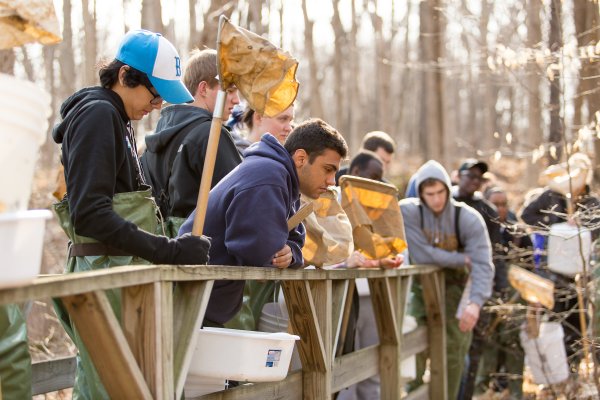Facilities
Exceptional resources in close reach.
The Biology Department’s on-campus facilities offer laboratory access for coursework, faculty research, and student investigations. Within a 15-minute drive, students can access some of the most ecologically diverse areas in the country.
Because of these rich resources, nearly all biology courses have a laboratory or field component to offer students hands-on learning opportunities.
Biology courses at Valpo take place in either the Neils Science Center (NSC), or the new Center for the Sciences: Chemistry & Biochemistry (CFS). Both facilities support cutting-edge laboratory teaching and learning, and also include comfortable, digitally-connected classrooms and labs.
Biology students have access to the department’s greenhouse, herbarium, cell culture laboratory, and a well-equipped microscopy laboratory. The department also has lab spaces dedicated to student investigations and faculty research. For example, in the new CFS, biologists and biochemists share a beautiful, spacious interdisciplinary research lab, which allows faculty members and students from two departments to “rub elbows” and interact with one another.
Microscopy Laboratory
Valpo’s microscopy laboratory contains a wide array of modern equipment and offers many classes that allow students to benefit from it. Recent additions include:
- A computer-interfaced scanning electron microscope (JEOL 35-CF). The department also has a critical point dryer and a sputter coater for sample preparation in electron microscopy.
- A Leica research grade microscope, with built in digital image capture.
- A Nikon wide-field fluorescence stereomicroscope with a research-grade digital camera attached to computers for image analysis
- 48 new Leica binocular compound microsopes, and 96 Nikon binocular compound microscopes
- 48 Leica stereo dissecting microscopes
- 2 Nikon phase contrast microscopes
- A fluorescence-equipped research grade Olympus compound microscope
Molecular Biology and Cell Culture Laboratories
The department is also well-equipped for laboratory work in molecular biology and cell culture. Recent equipment acquisitions include:
- 4 thermal cyclers for polymerase chain reaction experiments
- two manual DNA sequencing chambers
- agarose gel electrophoresis equipment
- 2 superspeed centrifuges
- 2 preparative centrifuges
- a NanoDrop spectrophotometer
- 2 Bio-Rad Chemi-Doc imaging systems
Valpo’s cell culture lab is equipped with:
- two laminar flow hoods
- a new, microprocessor-controlled water-jacketed carbon dioxide incubator
- a mega-pure water system
Cadaver Laboratory
In August, 2018, the department dedicated its state-of-the-art human cadaver laboratory, which is housed in NSC. This lab is used by advanced biology majors, most of whom are pursuing the premedical educational track. The Valparaiso University cadaver lab is one of a few undergraduate only cadaver laboratories in the state of Indiana.
The biology department makes extensive use of the abundant biological resources in the greater Valparaiso area. Classroom field trips, research projects, and Biology Club service days allow students to benefit from local and regional assets including:
- Chicago’s Shedd Aquarium and Field Museum of Natural History
- Indiana Dunes National Lakeshore and Indiana Dunes State Park
- Warren Dunes State Park, Michigan
- Sunset Hill Farm County Park
- Rogers-Lakewood City Park
- Coffee Creek Watershed Preserve
- Kankakee Fish and Wildlife Area
- Jasper-Pulaski Fish and Wildlife Area
Indiana Dunes National Lakeshore
The Indiana Dunes National Lakeshore and Lake Michigan are living laboratories, situated just 15 miles north of Valparaiso University’s campus. The Indiana Dunes ranks third of all U.S. National Parks in species diversity, and is where scientists first documented ecological succession. As such, the lakeshore allows students and faculty easy access to investigate ecological relationships.
Pierce Cedar Creek Institute
Valparaiso University has a partnership with the Pierce Cedar Creek Institute, a biological field station in southern Michigan. Set on 661 acres in rural Barry County, PCCI provides students and faculty with another opportunity for outdoor education. The property includes a diversity of habitats: wetlands, forests, marshes, streams, lakes, and prairies.
Valpo students can also apply for PCCI’s undergraduate scientific research grants, for student/faculty summer research collaborations at the field station. Students who are accepted into the program receive housing at PCCI, a sizable stipend, and the opportunity to conduct a full-time, 12-week research project alongside a faculty mentor.
